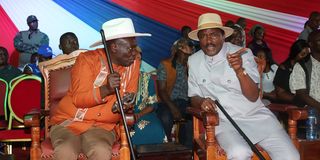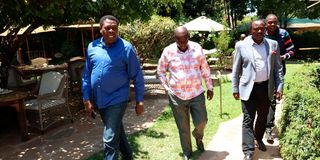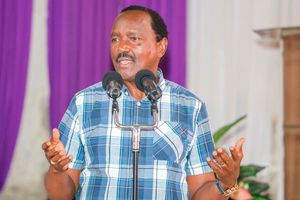
Former Deputy President Rigathi Gachagua and Wiper Leader Kalonzo Musyoka in Tseikuru, Machakos County on May 29, 2025.
Opposition leaders have retained the services of a consulting firm to help them select the best candidate, who they hope will end President William Ruto’s rule in the first round of voting in 2027.
The team has six months to deliver a preliminary report, meaning that by December, they will have a clear idea of the strongest ticket.
One of the presidential aspirants from the team, but who spoke in confidence, told the Nation that, given that they are up against a shrewd opponent, they must get it right.
He declined to disclose the firm's name, arguing that doing so could expose them to manipulation by their opponents.
Referring to a draft strategy paper to guide the firm's operations, the politician said that the data from the process will determine who the candidate will be. He added that consensus is one of the most preferred methods among the contenders to minimise the risk of a fallout.
The nascent coalition is doing everything within its power to keep its plans and next moves away from the government, fearing infiltration.
“I agree with the idea of hiring a consulting firm. The professionals can help us break any ties. I am confident that all of our leaders are united by one goal: to send (President) William Ruto home. We’ll decide when to announce our candidate; we're not in a hurry. When we do, we want to create a wave all the way to Election Day,” Makueni Senator Daniel Maanzo, a close ally of Musyoka, told us on Saturday.
The lawmaker added that they are open to other methods of achieving the same goal.
"Remember what Raila Odinga did in 2002 with his Kibaki Tosha endorsement? We can have one of the senior members of the team say 'so-and-so Tosha', and that's it. We will also conduct polls and surveys, and don't forget consensus. The timing is our secret weapon. We want to keep him (the president) guessing,” he said.

DAP-Kenya Party Leader Eugene Wamalwa, former Deputy President Rigathi Gachagua and Wiper Leader Kalonzo Musyoka in Nairobi on February 19, 2025.
Individual presidential hopefuls in the opposition group are said to have already hired experts to conduct opinion polls for them and the consolidated efforts could bolster this.
Breaking from traditional political horse-trading and boardroom deals, the emerging plan involves a scientific process — a systematic, research-backed method using opinion polls, ground intelligence, regional dynamics, and electability assessments to guide the selection of candidates and their running mates.
It entails commissioning credible polling firms to gauge the popularity, trust levels, and national appeal of each potential contender. The plan also involves simulating different scenarios to predict how each pair would perform.
Former Deputy President Rigathi Gachagua, who recently unveiled his Democracy for the Citizens (DCP) party; Wiper leader Kalonzo Musyoka; former Interior Cabinet Secretary Fred Matiang’i; Eugene Wamalwa of DAP-K; and People's Liberation Party (PLP) chief Martha Karua are at the centre of this plan.
The team also includes former Public Service Cabinet Secretary Justin Muturi, Party of National Unity (PNU) leader Peter Munya and former Agriculture Cabinet Secretary Mithika Linturi. Former President Uhuru Kenyatta and his Jubilee Party are said to back the opposition.
According to insiders, the scientific approach will also analyse voting patterns from previous elections, test various ticket combinations in simulated scenarios, and assess the regional and demographic strengths of each candidate.
"The goal is to rely on facts and data rather than emotion or seniority to select a ticket with the best chance of unseating the incumbent," a source within the opposition disclosed.
Mr Gachagua has urged patience regarding the naming of the opposition's flag bearer.
"Kenyans should not push us to announce an opposition flag bearer so that President Ruto does not erect barriers along the way. Give us time. There will be enough space for all of us. The most important thing is that we are committed to sending President Ruto home,” he said on Thursday at Mr Musyoka’s Tseikuru home.
According to insiders, they will create a powerful position, such as prime minister, and reserve it for Gen Z as part of a strategy to appeal to younger voters. Conservative estimates put the number of Gen Z voters at 10 million in the next general election. That's a large enough number to elect a president.
In the meantime, the principals have agreed to retreat home to consolidate their support bases.
"We want to create a kingpin out of each of them. Remember, all politics is local. From there, they all feed into a national pool, creating an even bigger support base. Then, we move on as a team," an expert from Mr Gachagua's camp told the Nation.
He added, "We have already done our modelling and have a rough idea of how this will go. We want to do this in one round of voting."
Mr Wamalwa quipped, "We should support the opposition presidential candidate identified by this team so we can send President Ruto back to selling chicken."
Yesterday, Kisii Senator Richard Onyonka, an ally of Dr Matiang'i, said, "We will consider all possible scenarios, and people will agree. People must be courageous enough to come forward and fight for the nominations," said Mr Onyonka.
He continued: "We will allow for a consensus, but if we are to go the delegates' way, we want a democratic process for selecting them without any ill intentions."
However, political ego and ambition may still override scientific findings, especially if a popular or seasoned contender is cynical about the data.
"If executed transparently and backed by all major players in the opposition, it could reshape coalition politics and present a serious threat to President Ruto’s re-election bid," argues Prof Gitile Naituli.
With President Ruto seemingly having secured the support or neutrality of ODM leader Raila Odinga ahead of the 2027 general election, Kenya’s opposition faces the monumental task of regrouping and crafting a winning alliance.
Mr Odinga's possible absence from the presidential ballot significantly alters the opposition landscape, creating an opportunity for a new flag bearer to emerge.
One touted scenario for the opposition ticket against Dr Ruto is a Fred Matiang'i–Kalonzo Musyoka ticket, said to have the backing of former President Kenyatta under the Jubilee Party.
This combination brings together technocratic strength and seasoned political experience.
Dr Matiang'i's record in government gives him a reformist image and attracts young voters. Mr Musyoka has a strong base in Ukambani and deep networks in national politics.
However, a major drawback would be the risk of alienating Mt. Kenya voters if the region is not represented as either the flag bearer or the deputy, which is a critical factor given the region's large voter base.
An alternative scenario would have Kalonzo as the flag bearer, with either Matiang’i or Wamalwa as his running mate.
This arrangement could fulfil Mr Musyoka’s long-standing ambition and establish him as a compromise candidate acceptable to multiple factions.
However, concerns remain about whether Matiang’i’s relatively small support base in Kisii would contribute significantly to the vote tally and whether Wamalwa could command the Western bloc.
Additionally, the absence of Mt. Kenya in the top two positions could draw voters from the region closer to Dr Ruto, particularly if Prof Kithure Kindiki remains his deputy.
Another possibility is the Kalonzo–Karua ticket, which appeals to reformist and gender equality narratives. Karua, who ran as Mr Odinga’s running mate in 2022, has national brand recognition. However, this ticket would likely have difficulty gaining traction in the Mt. Kenya region and would be seen as more of an Eastern ticket, which could lead to a rebellion in Western Kenya.
A Karua–Wamalwa pairing might gain traction in progressive urban areas and among reformist voters. However, it would have weak national appeal without a strong, vote-rich base. Both lack the expansive political machinery needed to mount a credible, nationwide campaign.
Additionally, excluding the traditional Mt. Kenya and Ukambani blocs from key positions on a ticket may prevent it from galvanizing the critical mass needed to counter Dr Ruto’s Kenya Kwanza juggernaut.
The Kalonzo–Wamalwa scenario offers ethnic balance and regional inclusivity by bridging the gap between Eastern and Western Kenya.
However, analysts say that excluding Mt Kenya from the top two could play into Dr Ruto’s hands, especially if he retains Prof Kithure Kindiki as his running mate
A ticket that ignores Mt Kenya, either for the top spot or the number two position, is likely to struggle, especially if Dr Ruto retains a foothold in the region through DP Prof Kindiki.
Analysts say the opposition must reconcile Mr Musyoka’s ambition with the reality that he may have to play second fiddle again if unity demands it.
Failing to balance these competing interests could lead to an easy re-election for Dr Ruto in 2027.








